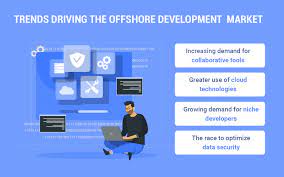The Benefits of Offshore Development Teams
Offshore development teams have become increasingly popular in the tech industry as companies look to leverage global talent and reduce costs. An offshore development team refers to a group of skilled professionals located in a different country or region than the company’s headquarters. This model offers several advantages that can help businesses thrive in today’s competitive market.
Cost Efficiency
One of the primary reasons companies opt for offshore development teams is cost efficiency. Hiring developers from countries with lower labor costs can significantly reduce expenses without compromising on quality. This cost savings can be allocated to other areas of the business, such as marketing or research and development, leading to overall growth and profitability.
Access to Global Talent
By establishing an offshore development team, companies gain access to a diverse pool of talent from around the world. This allows them to tap into specialized skills and expertise that may not be readily available locally. With a global team, companies can benefit from different perspectives and innovative ideas that can drive creativity and problem-solving.
24/7 Operations
Offshore development teams located in different time zones enable businesses to operate round-the-clock. This means that projects can progress continuously, with developers working on tasks during their respective daytime hours. This seamless workflow can lead to faster project completion and improved efficiency.
Scalability
Scaling up or down is easier with an offshore development team as companies can quickly adjust their workforce based on project requirements. Whether it’s expanding the team for a new initiative or downsizing after project completion, this flexibility allows businesses to adapt to changing market conditions without incurring significant costs.
Risk Mitigation
Distributing work across multiple locations through an offshore development team helps mitigate risks associated with unforeseen events such as natural disasters or political instability. By diversifying operations geographically, companies can ensure business continuity and minimize disruptions that could impact project timelines.
In conclusion, offshore development teams offer numerous benefits that can enhance a company’s competitiveness and efficiency in today’s fast-paced digital landscape. By leveraging global talent, reducing costs, and increasing operational flexibility, businesses can achieve sustainable growth and success in an increasingly interconnected world.
9 Essential Strategies for Managing Your Offshore Development Team Successfully
- Clearly define project requirements and expectations upfront.
- Establish effective communication channels to bridge any geographical gaps.
- Ensure that the offshore team is well-versed in the required technologies and tools.
- Set up regular meetings and check-ins to track progress and address any issues promptly.
- Provide detailed documentation to avoid misunderstandings due to cultural or language differences.
- Encourage a collaborative work culture between onshore and offshore teams.
- Consider time zone differences when scheduling meetings and deadlines.
- Allocate resources for training and skill development of the offshore team members.
- Monitor performance metrics to evaluate the effectiveness of the offshore development team.
Clearly define project requirements and expectations upfront.
When establishing an offshore development team, it is crucial to clearly define project requirements and expectations upfront. By providing detailed guidelines and objectives from the start, both the company and the offshore team can ensure alignment and understanding of the project scope. This proactive approach helps prevent misunderstandings, delays, and rework down the line, ultimately leading to a more efficient and successful collaboration. Clear communication of project requirements upfront sets a solid foundation for a productive working relationship between all parties involved.
Establish effective communication channels to bridge any geographical gaps.
Establishing effective communication channels is crucial when working with an offshore development team to bridge any geographical gaps. Clear and consistent communication helps ensure that all team members are aligned on project goals, timelines, and expectations. Utilizing tools such as video conferencing, project management software, and instant messaging platforms can facilitate real-time collaboration and foster a sense of unity among team members despite being located in different locations. By prioritizing open communication channels, companies can overcome barriers posed by distance and time zones, leading to improved productivity and project outcomes.
Ensure that the offshore team is well-versed in the required technologies and tools.
It is crucial to ensure that the offshore development team is well-versed in the required technologies and tools when establishing a successful partnership. By having a team that possesses expertise in the necessary technologies, companies can avoid delays, errors, and misunderstandings during the project lifecycle. Clear communication and alignment on technical skills and capabilities are essential for achieving project goals efficiently and effectively. This proactive approach helps streamline development processes, enhances collaboration, and ultimately leads to higher quality deliverables.
Set up regular meetings and check-ins to track progress and address any issues promptly.
Setting up regular meetings and check-ins with your offshore development team is crucial for ensuring project success. By maintaining open communication channels, you can track progress, address any issues promptly, and foster a collaborative environment. These meetings provide an opportunity to align on goals, clarify expectations, and identify potential roadblocks early on. Proactive communication helps build trust among team members and ensures that everyone is on the same page, leading to improved productivity and project outcomes.
Provide detailed documentation to avoid misunderstandings due to cultural or language differences.
To ensure effective communication and collaboration within an offshore development team, it is crucial to provide detailed documentation. Clear and comprehensive documentation helps mitigate misunderstandings that may arise from cultural or language differences among team members. By outlining project requirements, expectations, and specifications in writing, all stakeholders can refer to the same information, reducing the likelihood of misinterpretation. Detailed documentation serves as a valuable reference point for team members to align their understanding and work towards a common goal, fostering clarity and cohesion in offshore development projects.
Encourage a collaborative work culture between onshore and offshore teams.
Encouraging a collaborative work culture between onshore and offshore teams is crucial for the success of any offshore development project. By fostering open communication, mutual respect, and a shared sense of purpose, both teams can work together seamlessly towards common goals. Building trust and establishing strong relationships across borders not only enhances productivity and efficiency but also promotes innovation and creativity. Embracing cultural differences and leveraging diverse perspectives can lead to more effective problem-solving and ultimately drive the success of the entire development team.
Consider time zone differences when scheduling meetings and deadlines.
When working with an offshore development team, it is crucial to consider time zone differences when scheduling meetings and setting deadlines. Understanding the varying work hours of team members across different regions can help ensure effective communication and collaboration. By being mindful of time zone differences, companies can optimize productivity, avoid delays, and foster a cohesive working environment that maximizes the strengths of a global team.
Allocate resources for training and skill development of the offshore team members.
To maximize the effectiveness of an offshore development team, it is crucial to allocate resources for training and skill development of team members. Investing in continuous learning opportunities not only enhances the expertise and capabilities of the offshore team but also fosters a culture of growth and innovation. By providing access to training programs, workshops, and certifications, companies can empower their offshore developers to stay updated on the latest technologies and best practices, ultimately leading to higher productivity, quality output, and overall success of the project.
Monitor performance metrics to evaluate the effectiveness of the offshore development team.
Monitoring performance metrics is essential when evaluating the effectiveness of an offshore development team. By tracking key indicators such as project completion rates, quality of work, adherence to deadlines, and communication efficiency, companies can gain valuable insights into the team’s productivity and overall performance. Analyzing these metrics allows businesses to identify areas for improvement, address any issues promptly, and make data-driven decisions to optimize the offshore development process. Regularly monitoring performance metrics not only ensures that the team is meeting expectations but also helps in fostering a culture of accountability and continuous improvement within the organization.



